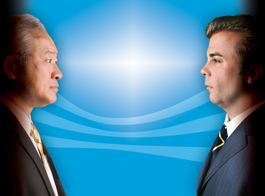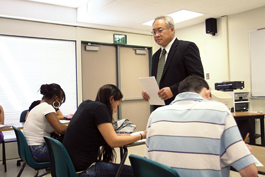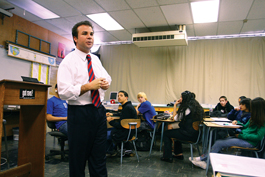home | metro silicon valley index | features | silicon valley | feature story

Photographs by Felipe Buitrago
Some Assembly Required
The District 22 Assembly seat has shaped Silicon Valley's political face during Sally Lieber's headline-grabbing tenure. The Democratic primary battle between Paul Fong and Dominic Caserta to replace her is a fight over whether or not this area is ready for a huge political shift.
By Erin Sherbert
PUT DOMINIC CASERTA in a room full of strangers and by the end of the night you can bet he will know every single one of them.
The slick Santa Clara councilman has the appeal and youthful energy on which the Silicon Valley was built. That's why the moderate Democrat feels confident taking on an established community organizer like Paul Fong in the Democratic primary for the 22nd Assembly District, which covers the heart of the Silicon Valley, from San Jose to Santa Clara.
Caserta, 32, has launched a highly competitive campaign Silicon Valley–style, tapping into big donors on the Internet and drawing support from all sides of the spectrum. On the other end of this state race, Fong is operating a campaign in his usual understated style. The progressive liberal and Chinese native has drawing power of his own in the South Bay, particularly among Latinos and Asian Americans, an emerging political force in local and state elections. Fong is so deeply connected with popular Democrats locally that he's collected a stack of loyal supporters almost effortlessly.
Despite their clashing styles and distinct politics, both Caserta and Fong have significant appeal to Silicon Valley. Even with other candidates in the race, including Santa Clara County Board of Education member Anna Song and Cupertino Councilmember Kris Wang, people have long pinned Caserta and Fong as the frontrunners for the June 3 Democratic primary.
The race is shaping up into a classic South Bay dogfight between a moderate and a progressive liberal, and it could be the most interesting race of this election year locally. "It's a toss-up right now," says Sally Lieber, who currently represents the 22nd District, but is termed out this year. "I know that up here in Sacramento business interests and moderate caucuses are interested in Dominic and more of the ethnic caucuses are interested in Paul. I expect it to be a big battle in the mail."
It's also a race with the potential to change the political landscape of this Silicon Valley district. Lieber's liberal, headline-grabbing legislation struck a chord with a majority of the voters, who elected her three times. But even Lieber herself admits that maybe the mood among voters has changed; it is much darker now than it was six years ago, in part because of the economy and housing slump.
With that could come a shift in the old-school liberal leadership of District 22, a diverse region covering high-tech corridors, multimillion-dollar mansions and mobile homes. Fong says he is the progressive candidate whose philosophies will closely resemble those of Lieber. But Caserta, while also running as a progressive, is clearly embracing his own plan for the district, a more moderate approach.

Fong: Old School Silicon Valley Progressive
You wouldn't expect Fong to run his political campaign as an antiwar crusader. Not this low-profile, suit-and-tie kind of guy who is nonconfrontational and always polite. But it was only in the last few weeks that Fong removed the peace symbol that dominated the homepage of his campaign website. Even though his campaign manager advised him to take it down and not address the issue of war, Fong's campaign literature still boasts the antiwar symbol.
But that's Fong for you: a soft-spoken political science professor who is firmly fixed in his liberal values and beliefs. Fong supporters liken him to Lieber, who is considered one of the most liberal and progressive lawmakers in the Assembly—and she has endorsed Fong. Besides the anti-spanking bill that earned Lieber name recognition across the nation, Fong says he's a big fan of most of her human-rights-oriented bills.
Fong is considered a populist and a family man who works silently behind the scenes to make things happen. He's been dubbed the godfather of the Asian American community, and is known for grooming this ethnic population into public office. District 22, incidentally, has the fourth largest Asian American population statewide.
"He is the king maker of all Asian-elected officials," says county Assessor Larry Stone, a Fong supporter. "He has identified potential candidates, mentored them, raises money for them, he introduces them to folks. He has done tremendous things."
Fong's social conscience was shaped during the Vietnam War, at the height of the Civil Rights movement. That's when Fong, a huge fan of former President Jimmy Carter, became deeply dedicated to helping minorities in his Sunnyvale community, where he now operates his family's flower shop.
But Fong's bid for state Assembly isn't his first shot at public office. Aside from his 14 years on the Foothill–De Anza Community College Board of Trustees, where he now serves as vice president, Fong ran for Sunnyvale City Council when he was 22.
At the time, he was a student at San Jose State University, where he studied sociology and Asian American studies. His political science professor encouraged the class to get involved in a local election. So Fong declared his candidacy for the Sunnyvale City Council race, where he was up against an ultraconservative incumbent as well as Stone. Fong mounted a solid campaign, but dropped out of the race three weeks before Election Day to support Stone. He felt that Stone was a strong, progressive candidate and he didn't want to take votes away from him.
But the experience only fueled his desire to get other Asian Americans politically involved. He has a long résumé of working within the community and establishing programs to help Asian Americans rise to the top. Most notably, Fong founded Asian Americans for Community Involvement, which has evolved into the region's largest community organization for Asian Americans, providing mental and social health programs.
"I'm a human rights type of guy," Fong says softly at his desk at San Jose's Evergreen Valley College. "I'm into building an equitable society."
He is what some call a traditional South Bay liberal. He's a pro-choice advocate of women's rights (he voted for Hillary), a life-long member of the NAACP and a civil rights activist, and he's proud to say he marched in the very first Earth Day. Fong is also a small business owner who says he understands the need for business to grow here.
In Sacramento, Fong says his priorities would include tackling legislation to create a single-payer, universal health-care system for Californians. Also, he would fight the governor's workers-compensation reform, which he says is discriminatory because it uses age, race and gender to decide what a disabled worker is paid. He'd also like to introduce a gay marriage bill.
"Very consistently, Paul has thought about what is good for the community first," said Nicky Gonzalez Yuen, a Fong supporter and chair of the political science department at Foothill–De Anza Community College. "You want someone in that position who is solidly grounded in the community and who can act as a caretaker."

Caserta: The New Economy Moderate
It's not surprising that Caserta has grabbed a great deal of support from Silicon Valley Republicans, who are a strong force in his campaign. The born-again Dem switched parties in 2000, just in time for his campaign for the Santa Clara City Council, where he has now served for six years.
It wasn't really hard for Caserta to start calling himself a Democrat. The Santa Clara native says he was fed up with the Republican values of stripping money and resources away from the region's most vulnerable populations, including his very own high school students.
But in case anyone is wondering about his Dem cred: Caserta says he's a proud card-carrying member of Planned Parenthood and a member of the Sierra Club. He admires John F. Kennedy, and says he supports the working class and believes in the right of workers to organize (a number of police and fire unions are endorsing Caserta).
So even if Caserta's most vocal opponents say he's "barely a Democrat," it seems that some of his strongest attributes, energy and innovation, truly reflect Silicon Valley at the core.
Indeed, pro-business politics is playing a big role in his campaign. But that's because Caserta wants to advance one of Silicon Valley's blossoming markets: the clean tech industry.
He's managing to skillfully balance his business agenda without appearing too connected to the conservative base of the district (roughly 30 percent of registered voters in the district are Republican). And it's clearly working. Caserta has well-rounded support, getting the endorsements of businesses interests across the region, including Intel, Microsoft, Hewlett-Packard and the Silicon Valley Chamber of Commerce as well as liberal progressive groups such as the California Nurses Association.
Maybe an endorsement from a big name Democrat like Lieber might have helped, at least in the primary, but Caserta isn't losing any sleep over it. Instead, he's relying on his "deliver now" record as a Santa Clara councilman to get district voters on his side.
"Dominic has been very effective in cultivating influential people not of his party," said Stone, who knows Caserta well even though he is supporting Fong. "I think that was a mistake that Paul has made, looking more toward his base. I think Dominic has convinced more conservatives and Republican folks that there will be a Democrat in this seat."
His set-politics-aside style is probably why he doesn't initiate deep conversation on touchy subjects like gay marriage or the war in Iraq. He won't even say which Democrat he supported in the presidential primaries.
Caserta, a well-rounded athlete with a blend of Portuguese and Italian roots, says he wants to bring California Democrats and Republicans together to balance the budget and deliver on cutting-edge policies.
"I want to govern from the middle," Caserta says, flashing a smile. "People are intrinsically moderate. We need to get beyond the division of are you this or are you that."
When it comes down to legislating, Caserta's has set his priorities for the district. He is keenly interested in melding three of the South Bay's most cherished issues: business, environment and education.
Right away, the Santa Clara high school teacher would look to initiate permanent tax credits for clean tech businesses; he wants to take Santa Clara's nationally recognized green power program statewide, with plans to give residents wind and solar options for electricity.
But his frustration with the state's education policy was the genesis of Caserta's campaign for state office. He points to his 11 years in the classroom as firsthand knowledge of how lawmakers have hurt students by consistently cutting education money. Caserta is emphatic about not supporting what he calls "Schwarzenegger's dark side"—or the state budget. He says that the budget hits the most vulnerable populations in the state, including students.
In fact, he would consider increasing fees if it helped generate new money for education and other critical needs in the state. He'd like to see smaller classes and more career and technical training in high schools. Why not offer those kids who aren't going to college other options, such as classes that train them in mechanics or even solar panel installation, Caserta suggests.
It's just that kind of enthusiasm and awareness that many feel make Caserta a refreshing pick for Assembly.
"He's the type to share what's on his mind," said San Jose City Councilman Pierluigi Oliverio, who is endorsing Caserta. "I think you have to rock the boat sometimes—not sink it, but at least ask the questions."
Déjà Vu
In many ways, this Assembly race is like watching a rerun of the 2002 race between Lieber and Rod Diridon Jr., who had planned to run again this year but dropped out in November.
At that time, Diridon was considered the business-backed candidate, getting support from the Chamber of Commerce and businesses as well as endorsements from the heavyweight Democrats in the state. Diridon ran an aggressive campaign against Lieber, who shocked some when she won the race with her grassroots, progressive platform supported by the community and environmentalists. It was one of the top three most competitive races in the state at the time.
Caserta is campaigning as a better reflection of Silicon Valley voters' political philosophy than Lieber—and by extension, Fong.
"When it comes to technology issues, ambitious issues, [she] and I are completely opposite," Caserta said. "I think that is where we will legislate differently."
The contrast between the candidates also calls to mind in some respects moderate Democrat Chuck Reed's San Jose mayoral bid against progressive Cindy Chavez in 2006. In that case, Reed's landslide victory surprised many in Silicon Valley who thought the backing of the South Bay Labor Council machine would at least make her candidacy competitive. Instead, voters roundly rejected Chavez, ushering in a swing from the liberal political philosophy of Reed's predecessor, the scandal-plagued Ron Gonzales.
Could such a shift be happening at a larger level in Silicon Valley? It's far too early to tell. Stone says the district has a history of picking the best candidate regardless of ideology.
"It has been represented by folks of different political philosophies," says Stone. "I think the people in this district focus on talent and focus on the issues more so than the average assembly district."
Send a letter to the editor about this story.
|
|
|
|
|
|